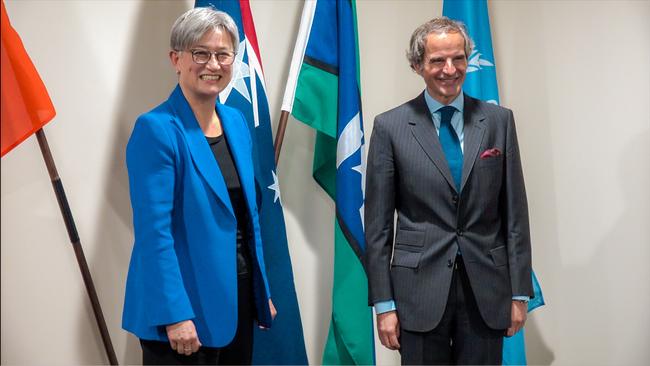Atomic chief Rafael Grossi warns of growing nuclear risks
Rafael Grossi of the International Atomic Energy Agency pointed to Iran’s nuclear work and Russia’s occupation of Ukrainian sites.

The head of the UN nuclear agency has given a sharp warning about growing risks, saying Iran’s activities risked a regional arms race and Russia’s occupation of Ukrainian nuclear sites threatened to imperil the agency’s ability to ensure material wasn’t misused.
In a speech at the Australian National University in Canberra, Rafael Grossi warned that “we are reaching a defining moment for global nuclear non-proliferation” in which the risks of the spread of nuclear weapons “pose a problem for everyone”.
With talks on restoring the 2015 nuclear agreement stalled and Iran stepping up its nuclear work, the head of the International Atomic Energy Agency on Tuesday said Iran’s actions — which include the production of highly enriched uranium — could persuade the country’s neighbours to ramp up nuclear programs.
“We are now in a situation where Iran’s neighbours could start to fear the worst and plan accordingly,” he said. “There are countries in the region today looking very carefully at what is happening with Iran, and tensions in the region are rising.”
He said some political leaders had on occasion “openly stated they would actively seek nuclear weapons if Iran were to pose a nuclear threat”.
Saudi Arabia, which has signed up to the lightest of international oversight, has expanded its nuclear program. Saudi officials haven’t ruled out enriching uranium, even as the kingdom, a strong foe of Tehran, insists that any nuclear program it pursues will be peaceful.
Israel has the only nuclear-weapons arsenal in the Mideast, but it refuses to confirm or deny possessing them. Israel has struck suspected nuclear-weapons efforts in Syria in 2007 and in Iraq in the early 1980s.
Mr Grossi’s speech comes after the IAEA director-general warned on June 10 that Iran’s decision to remove agency cameras from a range of nuclear-related sites could make it impossible within three to four weeks to keep tabs on Iran’s nuclear program, providing a fatal blow to efforts to revive the 2015 nuclear deal.
Since then, nuclear talks between the US and Iran in Doha proved unsuccessful and Tehran has said it won’t reverse its decision to reduce IAEA oversight.
The IAEA chief pointed to the verbal threat of using nuclear weapons first and aggression by nuclear-weapon states against non-nuclear countries, above all Russia’s invasion of Ukraine.
The IAEA has repeatedly warned that the conflict in Ukraine, which has a large civilian nuclear program, posed serious safety risks, and there have been a number of incidents which have provoked alarm, including a fire at Ukraine’s Zaporizhzhia plant during Russia’s occupation of the site. Staff were trapped for weeks at the now-defunct Chernobyl nuclear plant and at Zaporizhzhia, Europe’s largest nuclear plant, which contains six nuclear reactors.
The Russian army is transforming Zaporizhzhia into a military base overlooking an active front, intensifying a months-long safety crisis for the vast facility and its thousands of staff.
Mr Grossi, who has been trying to get access to Zaporizhzhia for an IAEA team to deliver safety equipment and carry out essential security work, warned that until now, the agency had been able to conduct all critical so-called safeguards work, to ensure that activities were monitored and nuclear material hadn’t been diverted for illicit purposes.
“But this is now in danger of soon no longer holding true,” he warned.
“With Zaporizhzhia NPP under Russian control, Ukraine’s regulator has informed us it has ‘lost control over’ the facility’s nuclear material that is subject to the safeguards agreement between Ukraine and the IAEA. ”
The IAEA has also lost contact with the remote monitoring connection at the site on multiple occasions, Mr Grossi said, although Ukraine’s nuclear regulator on Friday said it had restored connection to the surveillance systems at the site.
The Wall Street Journal



To join the conversation, please log in. Don't have an account? Register
Join the conversation, you are commenting as Logout